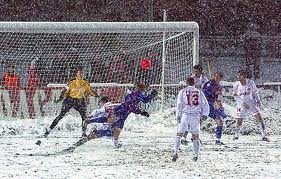By Richard van Poortvliet
Russian’s can be nostalgic. Every so often I will get into a conversation with a taxi driver in Moscow who will reminisce about the benefits of living in the Brezhnev era, which stability ruled over consumer choice. Over the last couple of months that is not the only thing Russian’s have been missing about the USSR as the possibility of resurrecting the Soviet Top Football League or ‘Vyshaya Liga’ is growing in popularity.
Spartak and CSKA Moscow fans speak with fondness about their numerous battles with fierce rivals Dynamo Kiev during the 1970s and 80s and it’s a former CSKA coach, who also coached Dynamo Kiev, who has come out as one of the new proposed league’s biggest supporters.
Valery Gazzaev, who is currently the president of Alania Vladikavkaz, a side who would lose out significantly if such a championship was created stated, but never the less, he is committed to the idea: “The level of football in Russia, Ukraine, Belarus and Kazakhstan will increase dramatically. It may not be the strongest league in Europe, but it will definitely be up there and the winners will have a great chance being able to challenge to win the Champions League or the Europa League.”
The benefits for clubs both on and off the field are numerous. Shakhtar Donetsk, are one of the supporters of creating the CIS league and it is understandable why. They are suffering from a distinct lack of competitiveness in their domestic competition.

The Ukrainian champions have dropped just two points out of a possible 53 this season after 18 games. Backed by billionaire Rinat Akhmetov, money is not an issue for the side from the Donbass region, however, if they are to be successful in the UEFA Champions League, it would help if they were playing against top class opposition, week in week out.
However, it is off the pitch were the real benefits for the clubs can be found. Every successful team in Russia and Ukraine has the backing of a large company such as Zenit St. Petersburg and Gazprom or a wealthy backer (Anzhi Makhachkala and Suleyman Kerimov).
Shakhtar Donetsk may be the closest thing there is to a club who are approaching self-sufficiency due to gates of 50,000 they collect from home matches. However these ticket prices are just a fraction of the cost that clubs such as Barcelona or Manchester United would charge for games at their respective stadiums.
Television money is where the best clubs around Europe make the bulk of their money. The English Premier League recently signed a deal which will see clubs share £5 billion for three seasons starting from the 2013-14 season. Compare this to Russia, where the local satellite broadcaster NTV+ agreed a sum of $60 million in 2011 just to win the rights for one season. However, if the CIS league gets off the ground then Sergey Stepashin, who’s the head of Russia’s audit chamber, believes the clubs could start to compete with their wealthier rivals from around Europe:
“According to our calculations, the top five clubs could earn in the region of 100 million dollars annually. Just to give you an example, this is the total budget of the Dynamo Moscow football club,” said Stepashin.
However, it seems as though there is a long way to go until the proposed CIS League can come to fruition. Although the number of Russian clubs supporting the idea is growing, with Terek Grozny the only club that are firmly against the idea, the league will need the support of UEFA and FIFA.
This is where the trouble starts for those hoping to see the best Russian and Ukrainian sides battling it out on a regular basis.
The Russia Football Union is against the idea, and perhaps understandably, as they would not want to lose overall control of their biggest commercial asset. However, FIFA president Sepp Blatter said in January in St. Petersburg: “creating a multinational league in the post-Soviet Commonwealth of Independent States is impossible and “goes against the principles of FIFA”.
The 76 year-old, later went on to state: “Clubs should organize club competitions, but within national federations. It’s the policy of FIFA and the whole world football family. We will never reconsider the boundaries of national leagues.”
This would appear to be a big blow to the likes of Zenit, Anzhi and Shakhtar, but all three clubs as well as a number of others who support the idea have wealthy and influential owners and I would not be surprised if discussions concerning the possibility of creating such a championship continue for months to come.
Contact the writer of this story at moc.l1751587320labto1751587320ofdlr1751587320owedi1751587320sni@o1751587320fni1751587320
Richard Van Poortvliet is a sport presenter and correspondent at Russia Today, based in Moscow.

